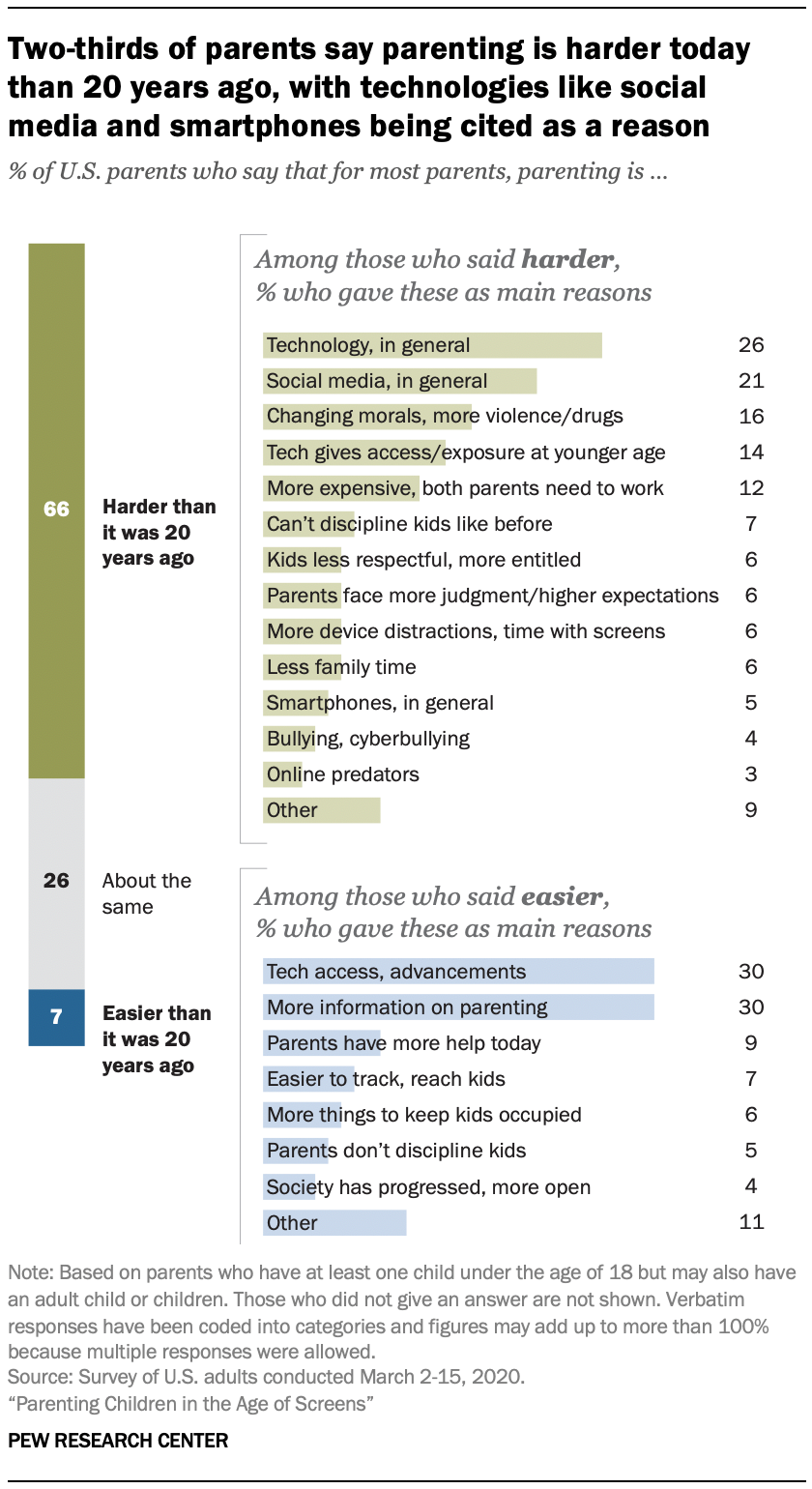Parenting children in the digital world can be challenging due to the constant exposure to technology and the potential risks involved. In today’s technologically advanced society, where digital devices are prevalent, parents face the daunting task of navigating the complexities and consequences of their children’s online activities.
The proliferation of social media, online gaming, and instant access to information poses unique challenges for parents, such as monitoring screen time, ensuring online safety, and fostering healthy digital habits. Moreover, the rapid evolution of technology makes it difficult for parents to keep up with the ever-changing landscape of the digital world.
Therefore, parenting children in the digital age requires vigilance, communication, and the establishment of appropriate boundaries to mitigate the potential risks and support the healthy development of children.

Credit: www.pewresearch.org
Table of Contents
Impact Of Digital Technology On Parenting
Parenting in the digital age poses challenges due to constant screen time exposure and online safety concerns. Balancing technology usage for children with real-world interactions can be demanding for parents today. Maintaining a healthy digital balance while fostering emotional connections is vital in navigating modern parenting landscapes.
Impact of Digital Technology on Parenting In today’s digital world, parenting has become more challenging due to the profound impact of digital technology on children’s lives. The constant exposure to screens and online activities has significantly altered the traditional parenting landscape. The two major aspects of this impact are decreased face-to-face interaction and 24/7 connectivity. “`htmlDecreased Face-to-face Interaction
“` The prevalence of digital devices has led to a decrease in face-to-face interaction among children, affecting their social and emotional development. Children are spending more time engaging with screens, limiting their opportunities for meaningful offline interactions with their peers and family members. This shift has made it challenging for parents to foster strong interpersonal skills and communication abilities in their children. “`html24/7 Connectivity
“` The 24/7 connectivity offered by digital technology has blurred the lines between playtime, education, and rest for children. With constant access to the internet and social media, children are exposed to various forms of content and interactions at all hours, leading to potential issues such as sleep disturbances, cyberbullying, and information overload. Parental concerns about monitoring and managing their children’s online activities have become more complex in this constantly connected environment. Overall, the impact of digital technology on parenting has brought about unique challenges that require proactive and mindful strategies from parents. By acknowledging these shifts and actively engaging with their children in the digital world, parents can navigate these challenges and promote healthy digital habits.
Credit: www.pewresearch.org
Digital Safety Concerns
Parenting in the digital world comes with its own set of unique challenges. One of the most significant concerns is digital safety. In this section, we will explore two major aspects of digital safety that parents need to be aware of: exposure to inappropriate content and cyberbullying risks.
Exposure To Inappropriate Content
Children today have easy access to a vast amount of online content, which includes both educational and entertaining material. However, this accessibility also leaves them vulnerable to stumbling upon inappropriate content. Inappropriate content can range from violent or sexual images to explicit language or dangerous ideologies.
To protect children from such exposure, parents should take appropriate precautions. Here are a few steps you can take:
- Install parental control software or applications that filter out inappropriate content.
- Talk openly with your child about the potential dangers of the internet and teach them how to navigate the online world safely.
- Set clear rules and boundaries regarding what is and isn’t acceptable when using digital devices.
- Regularly monitor your child’s online activities and keep an eye out for any warning signs of exposure to inappropriate content.
Cyberbullying Risks
The digital world has also given rise to another significant concern: cyberbullying. Cyberbullying refers to the use of technology to harass, intimidate, or humiliate others. With the prevalence of social media platforms and online communication channels, children can become victims of cyberbullying easily.
To protect your child from cyberbullying, it’s vital to:
- Encourage open communication with your child and create a safe space where they feel comfortable discussing their online experiences.
- Teach your child about digital citizenship and the importance of treating others with respect online.
- Monitor your child’s online interactions and address any signs of bullying promptly.
- Report incidents of cyberbullying to the necessary authorities or platforms to ensure appropriate action is taken.
By familiarizing yourself with these digital safety concerns and taking proactive measures to protect your child, you can navigate the challenges of parenting in the digital world and ensure their online experiences are safe and positive.
Managing Screen Time
Parenting in the digital world presents unique challenges, and one of the most prominent among them is managing screen time. With electronic devices becoming an integral part of our daily lives, children are increasingly exposed to screens at a young age. However, it is crucial for parents to set limits and strike a balance between online and offline activities to ensure their children’s well-being.
Setting Limits
Setting limits on screen time is essential for children’s development and overall health. With the abundance of educational and entertainment content available online, it’s easy for kids to get lost in the digital world. However, excessive screen time can lead to sedentary behavior, sleep disruptions, and even cognitive and emotional issues. To prevent this, parents can:
- Establish clear rules and communicate expectations about screen time with their children.
- Set specific time limits for different activities such as homework, recreation, and socializing.
- Monitor and restrict access to certain apps or websites that may be inappropriate or addictive.
Balancing Offline Activities
In today’s digital age, it’s important for children to engage in offline activities that promote their physical, cognitive, and social development. Balancing screen time with other activities allows children to explore their interests, develop hobbies, and interact with the world around them. Here are some strategies parents can employ:
- Encourage outdoor play, sports, and physical exercise to foster a healthy lifestyle.
- Promote reading books, participating in arts and crafts, or playing musical instruments to enhance creativity.
- Schedule regular family activities or outings to strengthen familial bonds and create lasting memories.
By implementing these measures, parents can ensure that their children have a well-rounded upbringing, where technology serves as a tool rather than a distraction. Managing screen time may be challenging, but with careful guidance and setting the right examples, parents can strike a healthy balance between the digital world and real-life experiences for their children.
Parental Role In Education
The parental role in education plays a crucial part in shaping a child’s behavior and knowledge, especially in the digital world. As children spend a significant amount of time online, parents need to actively participate in their education to ensure they develop the necessary skills to navigate the digital landscape responsibly.
Teaching Digital Literacy
Teaching digital literacy is a fundamental aspect of the parental role in education. It involves educating children about the safe and effective use of digital technologies. Parents can teach the importance of cybersecurity, identifying credible sources online, and understanding the impact of their digital footprint. By implementing specific guidelines and educational activities, parents can instill essential digital literacy skills in their children.
Monitoring Online Behavior
Monitoring online behavior is another critical responsibility for parents in the digital age. Setting clear boundaries and using monitoring tools can help parents become aware of their children’s online activities, enabling them to address any inappropriate behavior or potential risks. The regular communication and enforcement of expectations around online conduct can help ensure children engage in safe and responsible online behavior.
Impact On Parent-child Relationship
Parenting children in the digital age presents unique challenges that can impact the relationship between parents and their kids.
Communication Challenges
In digital world, communicating effectively with children becomes harder due to screen distractions.
Bonding In The Digital Age
Bonding with children is hindered by excessive screen time, affecting quality family interaction.

Credit: lessonbee.com
Frequently Asked Questions Of Why Can Parenting Children In The Digital World Be Challenging
Why Is It Important To Monitor Children’s Screen Time?
Monitoring screen time helps prevent addiction, improve sleep, and promote healthy development.
What Are Some Effective Ways To Set Digital Boundaries For Kids?
Establish clear rules, use parental controls, encourage offline activities, and lead by example.
How Can Parents Balance Technology Use And Family Time?
Schedule tech-free hours, prioritize face-to-face communication, engage in activities together, and create boundaries.
Conclusion
Parenting children in the digital world brings unique challenges. Navigating screen time, social media, and online safety requires proactive vigilance. Balancing technology with real-world experiences can foster healthy development. Understanding the digital landscape is essential for effective parenting in the modern era.
Embracing open communication and setting boundaries can empower children to navigate the digital world responsibly.
Leave a Reply